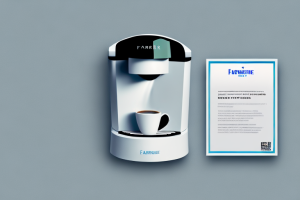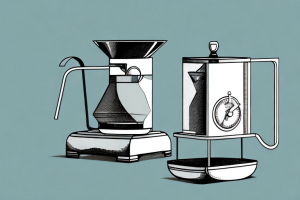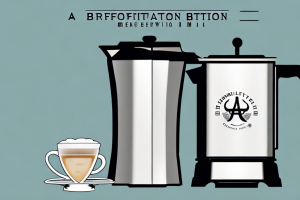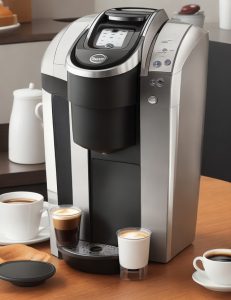How Many Watts Is A Coffee Maker

A coffee maker with a wattage meter attached
Coffee makers are a must-have in many households. But have you ever wondered how many watts your coffee maker consumes? Understanding the power consumption of coffee makers is important because it can affect your electricity bill and the brewing time and temperature of your coffee.
Understanding the Power Consumption of Coffee Makers
Coffee makers are electrical appliances that convert electrical energy into heat energy to brew coffee. This process requires a certain amount of power, which is measured in watts. The power consumption of coffee makers can vary depending on several factors, such as the type of coffee maker, its wattage, and the brewing time.
It is important to note that the power consumption of coffee makers can also be affected by the size of the coffee pot. Larger coffee pots require more energy to heat up and maintain the temperature of the coffee. Additionally, some coffee makers have features such as automatic shut-off or programmable settings, which can also impact their power consumption. Understanding the power consumption of your coffee maker can help you make informed decisions about energy usage and potentially save on your electricity bill.
The Science Behind the Electrical Efficiency of Coffee Makers
The electrical efficiency of coffee makers depends on their wattage and voltage. Wattage is the measure of power consumption, while voltage is the measure of electrical potential difference. A coffee maker with a higher wattage and voltage will consume more electricity and generate more heat than a coffee maker with lower wattage and voltage.
However, the type of coffee maker also plays a role in its electrical efficiency. Drip coffee makers, for example, are generally more energy-efficient than single-serve coffee makers because they can brew multiple cups at once. Additionally, some coffee makers come with energy-saving features such as automatic shut-off or programmable timers, which can help reduce electricity consumption.
How to Determine the Wattage of Your Coffee Maker
You can determine the wattage of your coffee maker by looking for its label or manual. The wattage is usually indicated in watts or amps. If you can’t find the label or manual, you can estimate the wattage by using a watt meter or by dividing the total watt-hours consumed by the total brewing time in hours.
It’s important to know the wattage of your coffee maker because it can affect your electricity bill and the performance of your appliance. A higher wattage coffee maker will heat up faster and brew coffee quicker, but it will also consume more energy. On the other hand, a lower wattage coffee maker may take longer to heat up and brew, but it will be more energy-efficient. Consider your personal preferences and energy usage when choosing a coffee maker with the appropriate wattage.
Different Wattage Requirements for Different Types of Coffee Makers
The wattage requirements for coffee makers can vary depending on their type. For example, drip coffee makers typically have a wattage range of 600-1200 watts, while espresso machines can consume up to 1500 watts. French presses and pour-over coffee makers don’t use electricity, so they don’t consume any wattage.
It’s important to consider the wattage requirements of your coffee maker when choosing a power source. If you plan to use your coffee maker in an RV or on a camping trip, you may need to invest in a generator or portable power bank with enough wattage to support your machine. Additionally, higher wattage coffee makers may require a dedicated circuit in your home to prevent tripping the breaker. Always check the wattage requirements of your coffee maker before plugging it in to ensure safe and efficient operation.
Energy-Saving Tips for Your Coffee Maker
If you’re looking to save electricity and reduce your electricity bills, there are several energy-saving tips you can apply to your coffee maker. For example, you can use a programmable coffee maker that automatically turns off after brewing, use a smaller coffee maker if you don’t need a large batch, or use reusable coffee filters instead of disposable ones.
Another energy-saving tip for your coffee maker is to use a thermal carafe instead of a hot plate to keep your coffee warm. A hot plate can use a lot of electricity to keep the coffee hot, even when it’s not being consumed. A thermal carafe, on the other hand, can keep your coffee hot for hours without using any electricity. Additionally, you can also consider using a French press or a pour-over coffee maker, which don’t require any electricity at all.
The Impact of Wattage on Brewing Time and Temperature
The wattage of your coffee maker can affect its brewing time and temperature. A coffee maker with a higher wattage can heat up the water faster and brew coffee quicker than a coffee maker with a lower wattage. However, a higher wattage can also result in higher brewing temperatures, which can affect the flavor and quality of your coffee.
It is important to note that the type of coffee beans you use can also play a role in how the wattage of your coffee maker affects the brewing process. For example, if you are using a darker roast, a higher brewing temperature may be necessary to bring out the full flavor of the beans. On the other hand, a lighter roast may require a lower brewing temperature to prevent over-extraction and bitterness. Therefore, it is important to experiment with different wattages and brewing temperatures to find the perfect balance for your preferred coffee beans.
How Wattage Affects Your Electricity Bill
The wattage of your coffee maker can affect your electricity bill. The higher the wattage, the more electricity your coffee maker will consume, which can result in higher electricity bills. Choosing a coffee maker with a lower wattage or using energy-saving tips can help you save money on your electricity bills.
It’s not just coffee makers that can affect your electricity bill. Appliances with higher wattage, such as air conditioners and refrigerators, can also contribute to higher electricity bills. It’s important to consider the wattage of all your appliances when trying to save money on your electricity bills.
In addition to choosing appliances with lower wattage, there are other energy-saving tips you can use to reduce your electricity bills. These include turning off lights and electronics when not in use, using energy-efficient light bulbs, and adjusting your thermostat to a more energy-efficient temperature.
Comparing the Wattage of Popular Coffee Maker Brands
Popular coffee maker brands like Keurig, Cuisinart, and Breville have a range of coffee makers with different wattages. For example, Keurig’s K-Classic Coffee Maker has a wattage of 1500, while Cuisinart’s DCC-3200P1 Programmable Coffee Maker has a wattage of 1025. By comparing the wattages of different coffee makers, you can choose the right one that fits your needs and budget.
However, it’s important to note that wattage isn’t the only factor to consider when choosing a coffee maker. Other factors such as brewing time, capacity, and ease of use should also be taken into account. For instance, if you’re always in a rush in the morning, you might want to consider a coffee maker with a shorter brewing time.
Additionally, it’s worth mentioning that higher wattage doesn’t necessarily mean better coffee. While a higher wattage coffee maker may heat up faster, it doesn’t necessarily guarantee a better tasting cup of coffee. The quality of the coffee beans, water temperature, and brewing method also play a significant role in the taste of your coffee.
Choosing the Right Wattage for Your Coffee Making Needs
Choosing the right wattage for your coffee making needs depends on several factors, such as the number of cups you need to brew, your budget, and your electricity consumption. If you need to brew large batches of coffee, a coffee maker with higher wattage may be suitable for you. However, if you only need to brew small batches or are on a budget, a coffee maker with lower wattage may be more appropriate.
Another factor to consider when choosing the right wattage for your coffee maker is the brewing time. A higher wattage coffee maker can brew coffee faster than a lower wattage one. If you are always in a hurry and need your coffee quickly, a higher wattage coffee maker may be the best option for you.
It is also important to note that higher wattage coffee makers tend to be more expensive than lower wattage ones. If you are on a tight budget, you may want to consider a lower wattage coffee maker. However, keep in mind that a higher wattage coffee maker may be more energy-efficient in the long run, which can save you money on your electricity bill.
The Relationship between Voltage and Wattage in Coffee Makers
The relationship between voltage and wattage in coffee makers is important because it determines how much electricity they consume and how much heat they generate. A coffee maker with higher voltage and wattage will consume more electricity and generate more heat than a coffee maker with lower voltage and wattage.
It is important to note that the voltage and wattage of a coffee maker can also affect the taste of the coffee it produces. If the voltage and wattage are too high, the coffee may be over-extracted, resulting in a bitter taste. On the other hand, if the voltage and wattage are too low, the coffee may be under-extracted, resulting in a weak and flavorless cup. Therefore, it is important to choose a coffee maker with the appropriate voltage and wattage for your desired taste and brewing preferences.
Factors that Affect the Energy Efficiency of a Coffee Maker
The energy efficiency of a coffee maker depends on several factors, such as its wattage, voltage, brewing time, temperature, and insulation. Coffee makers with lower wattage and voltage, shorter brewing time, lower temperature, and better insulation can be more energy-efficient and save you money on your electricity bills.
In conclusion, understanding how many watts your coffee maker consumes is important for your electricity bills and the quality of your coffee. By considering the factors we’ve discussed above, you can choose the right coffee maker that fits your needs and budget and apply energy-saving tips to reduce your electricity consumption.
Another factor that can affect the energy efficiency of a coffee maker is the type of coffee used. Some types of coffee require more energy to brew than others. For example, espresso requires a higher temperature and pressure to extract the flavor, which can consume more energy than regular drip coffee. Additionally, using pre-ground coffee instead of whole beans can also affect the energy efficiency, as pre-ground coffee can clog the filter and require more energy to brew. Therefore, choosing the right type of coffee and grinding it fresh can help you save energy and improve the taste of your coffee.



